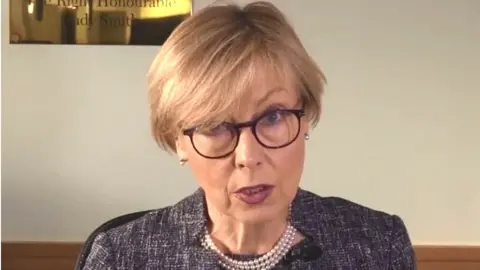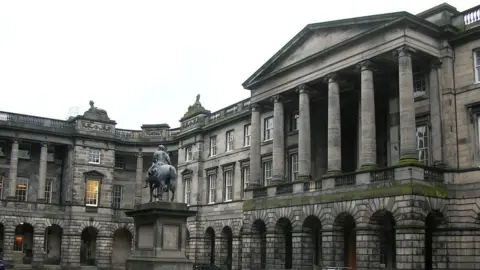Inquiry judge's media ban 'unlawful', Court of Session hears
 Scottish Child Abuse Inquiry
Scottish Child Abuse InquiryA senior judge prevented the BBC from properly reporting a £2.6m legal claim against Scotland's child abuse inquiry, a court has been told.
The Court of Session heard how Lady Smith, chairwoman of the Scottish Child Abuse Inquiry (SCAI), faced an employment tribunal claim in 2019.
Lady Smith passed orders which stopped detail of the action being reported.
The top judge denied any wrongdoing in regard to the claim that was later abandoned.
The employment tribunal case alleging discrimination, harassment and victimisation was from a former senior member of the inquiry legal team.
BBC Scotland has raised a judicial review of the SCAI restriction orders, arguing they were beyond the powers of Lady Smith and her involvement in the case meant any restriction decision should have been made by the employment tribunal.
'Open justice principle'
But Roddy Dunlop QC, advocate for the SCAI, told the Court of Session the corporation's case was academic as the original restriction order had been overtaken by another order.
Mr Dunlop also argued the BBC had not spelled out to the SCAI what detail it wanted to publish in relation to the tribunal.
Kenneth McBrearty QC, acting for the broadcaster, told the court the purpose of the original restriction order was, "not merely to prohibit disclosure or publication of the documents. It was to prohibit disclosure or publication of the very existence of the proceedings".
He said: "It is in effect what is equivalent to what in England has been described as a super injunction. That is what in effect it amounts to because it prohibits even the disclosure of the proceedings.
"The importance of this case lies with the way the Restriction Order impinged on the open justice principle. If there was a need for an order restricting the disclosure of any material, that is an order to be sought from the employment judge."

The Court of Session heard the employment tribunal claim for £2.6m damages was brought in July, 2019, by the inquiry's former lead junior counsel, John Halley.
A news release, issued by SCAI in October 2019, confirmed existence of the claim and a denial that Lady Smith had discriminated against Mr Halley. An initial hearing took place that month and Mr Halley abandoned the tribunal two months later.
But Mr McBrearty QC said the SCAI press release did not include the full outline of the claim
He said: "All that the media was to be entitled to publish was that which the respondent had considered able to include in a press release in circumstances to which the respondent was herself party in the proceedings."
The BBC is seeking declarators from the Court of Session stating that Lady Smith's restriction orders were unlawful.
'Potency' of orders challenged
Roddy Dunlop QC said the BBC had the option to present to Lady Smith what it wanted to report on in the case, as per the detail of the media restriction order, and then get her permission to publish but failed to do so.
He said: "That simple request is all that needed to be done and it wasn't resorted to. That's why the alternative remedy aspect of this is a problem to the BBC.
"There needs to be a practical effect, the entitlement to publish could have been obtained at any point by asking."
Mr Dunlop pointed out that the original restriction orders objected to by the BBC have now been replaced by a new order issued in March last year.
He said: "What is the point of challenging orders which cease to have any potency.
"Why is it we continue to expend grey matter, and more importantly public funds on both sides, in fighting on something which is in any view within the terms of the reference [of the SCAI inquiry] and within article ten [of Human Rights legislation]."
On Wednesday Mr Dunlop will continue his submissions before Lord Boyd.
